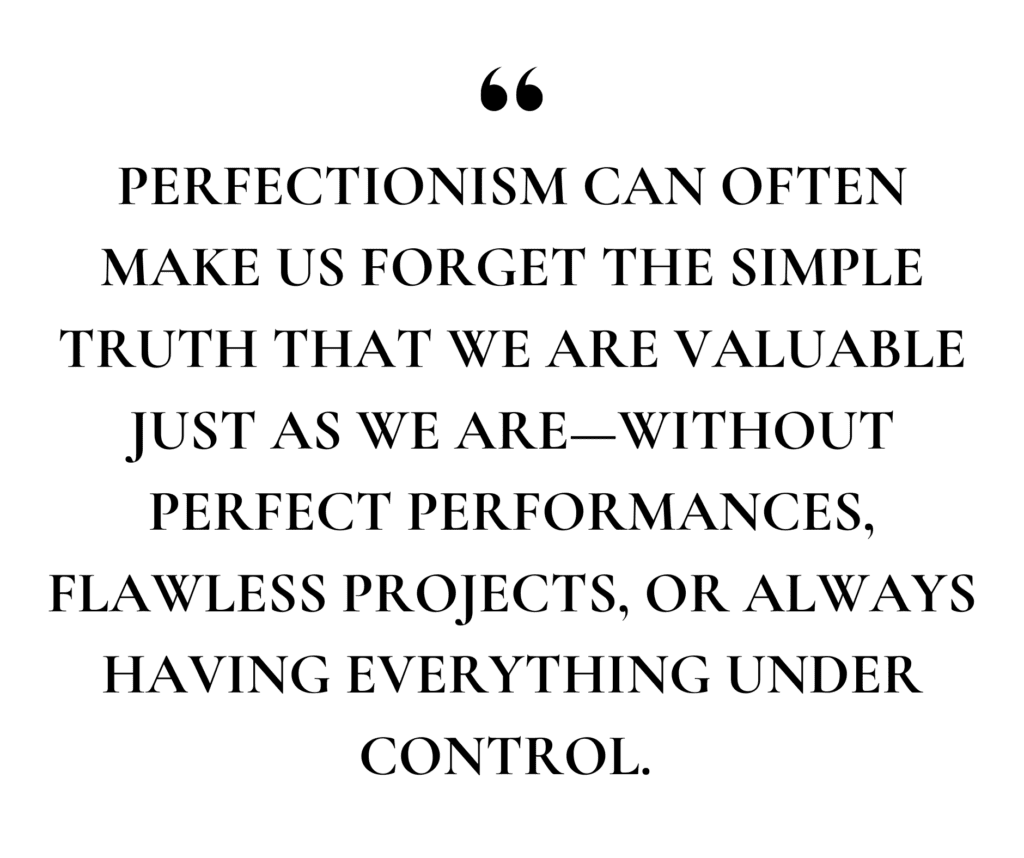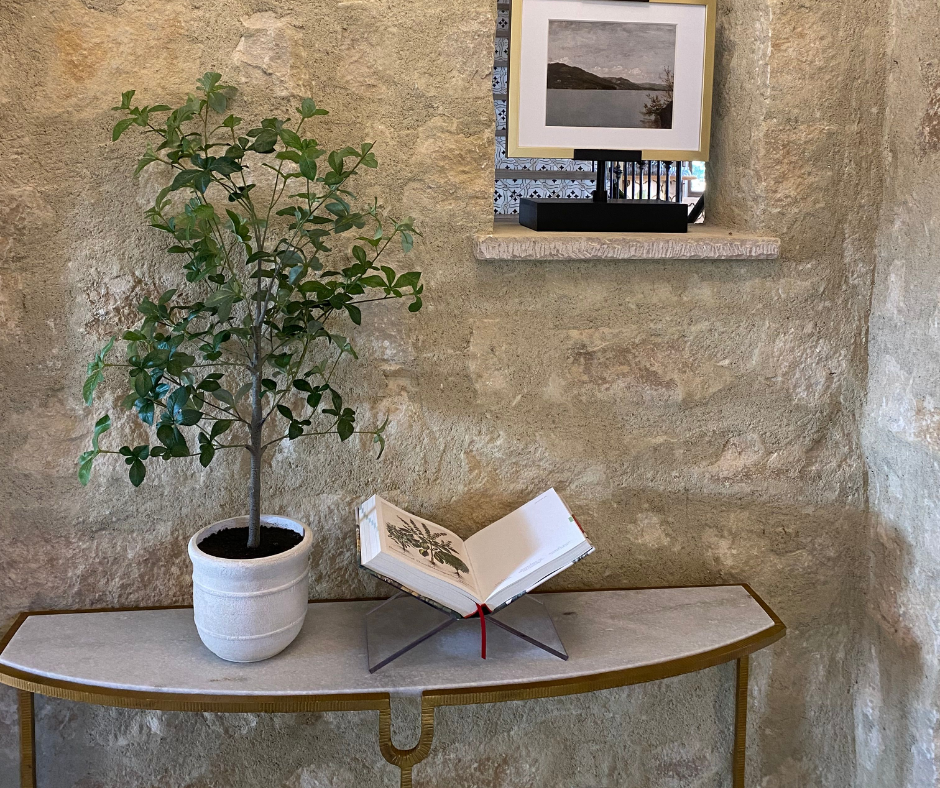
Overcoming Perfectionism: How to Let Go When Everything Feels Like It’s on You
Summary
Overcoming perfectionism is essential for creative women juggling careers, family, and personal projects. This article provides actionable tips to help you let go of perfectionist tendencies, reduce burnout, and reclaim your energy for the things that truly matter. Learn how to embrace “good enough,” delegate tasks, create flexible routines, practice self-compassion, and set boundaries with your time and energy.
Reflection Questions
- In what areas of your life does perfectionism show up the most—your work, relationships, or self-care?
- How does perfectionism impact your emotional well-being and creativity?
- What small changes could you make to prioritize progress over perfection in your daily life?
Journal Prompt
Write about one perfectionist habit you could let go of this week. How would releasing that pressure change your day-to-day life? How would it impact your creativity and relationships?
Perfectionism can feel like both a badge of honor and an impossible weight, especially for creative women juggling careers, passion projects, and family. You want everything to be just right—whether it’s your work, your home, or the way you show up for the people you love. But the truth is, that constant drive to get things “perfect” can leave you feeling overwhelmed, exhausted, and stuck in a never-ending cycle.
Picture this: you’re wrapping up a project late into the night, thinking about the next day’s family commitments, and somehow, it still feels like you’re not doing enough. Sound familiar? With sky-high expectations set solely by themselves, perfectionists tend to be so self-critical! The good news is, letting go of perfectionism doesn’t mean letting go of your values or standards—it means creating space for joy, creativity, and balance. In this article, we’ll explore the real toll of perfectionism and share actionable tips to help you release the pressure, find peace in “good enough,” and reclaim your energy for what truly matters. Here’s how to overcome perfectionism so you can live a more meaningful, stress-free life.
What Exactly is Perfectionism?
Perfectionism is often seen as a positive trait, but it goes beyond just striving for excellence. It’s an all-consuming need to meet impossible standards and unrealistic expectations, often driven by a fear of failure or disappointing others.

There are different types of perfectionism. Self-oriented perfectionism or self-critical perfectionism is where we hold ourselves to unattainable standards. Socially prescribed perfectionism is where we feel pressure from others to be perfect. Other-oriented perfectionism is where we expect perfection from those around us. Most perfectionists fall in the first two categories.
While the pursuit of quality work is commendable, perfectionism can become toxic when it paralyzes you, making it hard to finish anything because nothing ever feels “good enough.”
What Do Studies Show?
Perfectionism can be a lifelong struggle with behavioral and mental health implications. This 2011 study notes that “Perfectionism has been associated with higher levels of psychological maladjustment and disorder in adolescence and lower levels of subjective well-being and psychological adjustment.”
This means that when teenagers try to be perfect all the time, it often leads to more mental health struggles, like stress, anxiety, or feeling unhappy. It also means they are less likely to feel good about themselves and find it harder to cope with life’s challenges. Basically, aiming for perfection can make them feel worse instead of better.
These perfectionist behaviors often begin in childhood and the teenage years but can continue to affect people well into adulthood. The pressure to be perfect can lead to ongoing mental health challenges, making it harder to feel satisfied or well-adjusted in later life too. In other words, the habit of always striving for perfection doesn’t just stay in the teenage years—it can carry over and impact our happiness and well-being as adults.
Why Does Perfectionism Feel So Personal for Creative Women?

For creative women, perfectionism is often deeply tied to identity. The desire to express oneself through work, while balancing personal responsibilities, creates a unique pressure. Society places a high value on women “having it all”—thriving in their careers, raising families, and being present for their communities.
Add to this the personal expectation to produce meaningful, flawless creative work, and it becomes a recipe for burnout. The weight of cultural and societal expectations, combined with personal ambition, makes perfectionism feel especially personal and difficult to escape.
The Impact on Your Creativity and Well-being
Perfectionism can be a silent creativity killer. When every decision feels monumental, it’s hard to take risks or explore new ideas. Instead of freeing you to create, perfectionism can lead to creative paralysis, where the fear of making a mistake stops you from starting or completing projects.
Emotionally, it can drain your confidence and increase anxiety, making you feel like you’re constantly falling short. Physically, the stress can manifest as exhaustion, headaches, or even more serious health issues. Letting go of perfectionism doesn’t mean lowering your standards—it means protecting your well-being so your creativity can flourish.
Think About It: Reflection Questions for the Perfectionists Among Us
Taking a moment to reflect can help you identify how perfectionism shows up in your life. Start by asking yourself: What areas of your life are most impacted by perfectionism? Is it in your creative work, your family, or even your self-care? How does perfectionism make you feel—anxious, overwhelmed, or constantly behind?
Finally, think about the difference between “done” and “perfect.” What would it mean to you if you could embrace “good enough” in certain areas, rather than striving for perfection every time? Reflecting on these questions can open the door to healthier habits and more joy in your creative pursuits.
Here’s How to Overcome Perfectionism and Enjoy Your Life Again!

As creative women, we often wear many hats—business owner, artist, caretaker, friend, and more. The desire to excel in every role can feel like it’s all on us, and perfectionism keeps us spinning our wheels. But the cost of trying to do it all is high. Perfectionism drains our energy, adds stress to our daily lives, and leaves us feeling like we’re never quite enough. The truth is, you don’t have to do everything perfectly to be successful or fulfilled. Making mistakes is okay! Letting go of this constant need can create space for more joy, creativity, and connection in your life.
Letting go of perfectionism isn’t easy, but with a few practical strategies, it’s absolutely achievable. These tips are designed to help you reclaim your energy, fuel your creativity, and stay present for what truly matters in your life. Let’s explore how you can shift your mindset and habits to embrace imperfection and thrive, both in your personal and creative pursuits.
Fuel your creative fire & be a part of a supportive community that values how you love to live.
subscribe to our newsletter
*please check your Spam folder for the latest DesignDash Magazine issue immediately after subscription

Actionable Tip 1: Embrace the Concept of ‘Good Enough’
Striving for perfection in every detail often leads to burnout and frustration. Instead, embrace the idea that “good enough” really is enough. You don’t need to perfect every project or moment to feel successful. The key is setting realistic expectations for your work and your life, allowing room for growth rather than perfection.
How to Implement: Set realistic expectations for your projects.
Assess your current workload and create manageable goals. Ask yourself: “What outcome would make me feel satisfied?” Aim for progress over perfection and give yourself permission to complete tasks without obsessing over every detail.
Exercise: Complete a small task at 80% and move on.
Choose one small task today—whether it’s sending an email, organizing your workspace, or finishing a design—and stop when you’ve completed it to 80%. Resist the urge to go back and fine-tune. Trust that good enough really is good enough.
Actionable Tip 2: Learn to Delegate or Ask for Help

You don’t have to carry the entire load alone. One of the most empowering ways to overcome perfectionism is learning how to delegate tasks or ask for help when needed. It allows you to focus on what matters most while trusting others to handle the rest.
How to Implement: Identify areas where you can relinquish control.
Think about the tasks you currently manage that someone else could help with. This might be business-related, like outsourcing design work, or at home, such as sharing responsibilities with your partner or family. Letting go of control in small areas will free up mental space for bigger creative ideas.
Actionable Step: Delegate one task this week.
Pick one task—big or small—that you can delegate to someone else this week. Whether it’s a work project or a household chore, practice letting someone else take the reins while you focus on higher priorities.
Actionable Tip 3: Create Routines, Not Strict Rules
Strict rules can make life feel rigid and stressful, especially when things don’t go according to plan. Instead, create flexible routines that provide structure without the pressure to follow them perfectly. Routines should support your well-being, not add to your stress.
How to Implement: Develop flexible routines that allow room for adjustment.
Map out a daily or weekly routine that gives you a sense of flow, but build in flexibility. If a routine feels like a burden or leads to frustration when life gets in the way, it’s time to adjust and give yourself grace.
Actionable Step: Review your routine and find one area where you can ease up.
Look at your routine and identify one area where you can loosen the reins. Maybe it’s giving yourself an extra 10 minutes in the morning or allowing for spontaneous creative time during the day. Flexibility is key to reducing stress. Remember, all of your goals should be attainable goals—not tied to perfection in every aspect.
Actionable Tip 4: Practice Self-Compassion and Positive Self-Talk
Perfectionism often comes with a harsh inner critic. But practicing self-compassion and replacing negative self-talk with encouragement can significantly reduce that pressure. A kind and supportive mindset helps you handle challenges with more ease and creativity.
How to Implement: Shift from self-criticism to self-encouragement.

Whenever you catch yourself being overly critical, take a deep breath and reframe your thoughts. Focus on what you’ve achieved, rather than what’s lacking. Remind yourself that imperfections are part of the journey, not setbacks.
Actionable Step: Write down a positive accomplishment whenever you criticize yourself.
Next time you criticize yourself for not being perfect, write down one thing you’ve accomplished instead. This simple action helps you shift your mindset from judgment to appreciation and builds confidence over time.
Actionable Tip 5: Set Boundaries with Your Time and Energy
Perfectionism often makes us feel like we need to say “yes” to everything. Setting boundaries helps you protect your time and energy, ensuring that you prioritize tasks that truly matter while letting go of unnecessary commitments.
How to Implement: Prioritize tasks and conserve your energy for what matters most.
List out your tasks and responsibilities for the week and ask yourself which ones are truly essential. Focus on these, and give yourself permission to delay, delegate, or eliminate lower-priority tasks that drain your energy.
Actionable Step: Eliminate or delay one low-priority task from your schedule.
This week, take one low-priority task off your plate, or push it to a later time. Whether it’s a work task or something on your personal to-do list, clearing this space will allow you to focus on what brings you joy and fulfillment.
Final Thoughts: You Deserve Joy Without the Pressure of Perfection

Your worth is not defined by how perfectly you juggle all the roles in your life. You deserve joy, fulfillment, and time for the things that inspire you, without the constant pressure to be perfect. By learning to let go and set achievable goals instead of sticking to incredibly high standards no one could ever meet, you can start to reclaim that joy.
As you learn to let go, remember that perfection doesn’t define your value—your creativity, compassion, and presence in your family’s life do. You are enough as you are, and allowing yourself the freedom to make mistakes, delegate tasks, and embrace imperfection is a powerful act of self-care. It’s okay to release the pressure and trust that progress is more important than perfection.
This week, commit to letting go of just one perfectionist habit. Maybe it’s allowing yourself to delegate a task at work, or perhaps it’s simply completing a project without going back for endless revisions. Whatever it is, take one step toward letting go, and notice the space it creates in your life for creativity and connection.
Fuel your creative fire & be a part of a supportive community that values how you love to live.
subscribe to our newsletter
*please check your Spam folder for the latest DesignDash Magazine issue immediately after subscription









